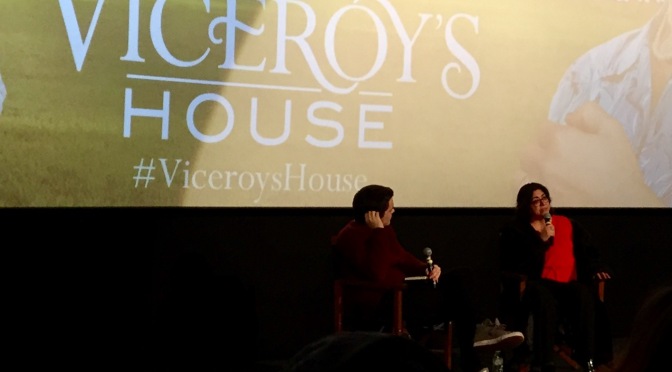TWENTY five years ago, Gurinder Chadha became the first Asian woman to make a feature film in Britain with Bhaji on the Beach. Fourteen years ago she then directed Bend it Like Beckham, a film that launched the career of a certain Keira Knightley and was a box office success story.
Unbelievably, as Chadha’s latest film, Viceroy’s House, is released in cinemas later this week, she remains the only female British-Asian filmmaker making a living in her profession. Her lone presence is a shocking indictment that extends to all facets of the industry: studios, financiers and audiences.
Even with the dearth of British-Asian voices behind the camera and faces in-front of the camera, it is still shocking that ‘Viceroy’s House’ is the first British film to deal directly with the Partition of India since Ghandi – released 35 years ago.

Speaking at a Picturehouse Central question and answer session in London after a preview of the film, 57-year-old Chadha, who grew up in Southall, West London, explained her decision to make a ‘populist’ film about a tragic time in India’s history.
She said: ‘I did not want to make a film for experts and academics who already knew about the subject [She has produced a BBC documentary on Partition later this year for that particular audience]. I came from the premise that a lot of people do not know where India and Pakistan are on the map.
‘In our schools a lot of our children do not know Britain had an Empire because it is not taught on the curriculum anymore. I wanted to make it accessible to people who knew nothing about the history, but also my children and their friends who would be able to learn about the past.’
Indeed, Chadha’s film takes a number of noticeable steps to appeal to a mass audience, including a more simplistic approach to the political discourse and a less graphic approach of the horrific violence. She also uses Lord Mountbatten and the major political forces involved as a Trojan horse to focus on how ordinary people were affected by the chaotic dividing of a nation.

Chadha explained: ‘I wanted to make sure that history did not just to belong to the important men and the important leaders, but we saw also the effects of the decisions on ordinary people.’
The ripple effects of Partition on ordinary people were extraordinary – and immeasurably sad. More than 14 million people were uprooted from their homes in the largest mass migration in human history.
As explained in the closing credits, Chadha’s aunt was one of more a million causalities of that traumatic event. The director admitted that growing up in London she still ‘lived under shadow of Partition’ after her family home was lost in the creation of Pakistan.
It is a shadow that Chadha confronted when she made her first visit to Pakistan in 2006 for the BBC show Who Do You Think You Are. The ‘overwhelming’ and warm greeting she received from the locals – and thoughts of her aunt’s cruel death – inspired her decision to subvert the historical period drama genre in Viceroy’s House by placing emphasis on ordinary people.

Even still, the Bend It Like Beckham writer-director is under no illusions that her film may divide opinion in Pakistan and India when it is released there later this year. For Pakistani’s, Partition marks the birth of their nation and a cause for celebration. The same joy is not shared among Indian’s, who largely view the event as a shameful disaster.
Chadha also spoke of the ‘suspicious’ relationship that still exists between these young and inward-looking nations. A mistrust that has resulted in further conflict since Partition, and permeates through every possible power structure. In fact, Chadha was recently denied a visa to shoot her documentary in Pakistan due an on-going dispute between the two nation’s film industry’s.
Chadha hopes that her different perspective as a British-Asian woman can help overcome the historical challenge of presenting a balanced picture of Partition. She said: ‘I could have made a movie where I pointed fingers, where I villainised one group over another. But I didn’t think in this day and age that was a befitting film for me to make about divide and rule. It was more befitting for me to present information. Present what everyone’s position was, what everyone’s agenda was and then let people point fingers or make their minds up.’
Like many films, the current political climate has given another layer of significance and relevance to the harsh history told in Viceroy’s House. In one scene, Mountbatten assures a servant that ‘Muslims will never be treated as second-class citizens’ – a notion that will register with many currently trying to pass through the Trumpian border control into America.

Chadha’s sees her film as an apt warning to those who support Trump’s stance on Muslims. She said: ‘The film is a timely reminder of what happens when politicians use divisive tactics and do use the race card to divide us. It is easier to divide us and rule us and easier to scapegoat people than to actually govern issues of employment, health and education.’
Ultimately, Chandha wants her film to bring people closer, whether they are Indian, Pakistani, British or even American.
She finished the Q&A with this powerful message of hope: ‘It is a healing film because being a mother I have to do that. I have to feel like there is something in the human spirit that can rise above the atrocities that we do to each other as humans in order for us to create a society that is good for us, our children and their children.’
This country needs more Gurinder Chadhas. Our film industry needs more Gurinder Chadhas.
Tune into Prestridge² on Wednesday for my review of Viceroy’s House
